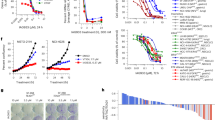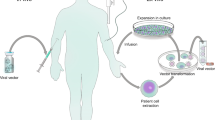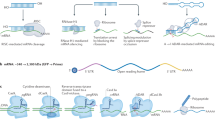Abstract
Neprilysin (neutral endopeptidase, NEP) is a cell surface peptidase whose expression is lost in approximately 50% of prostate cancers (PC). NEP normally functions to inactivate peptides such as bombesin and endothelin-1, and potentiates the effects of the PTEN tumor suppressor via a direct protein–protein interaction. NEP loss contributes to PC progression. We investigated the therapeutic efficacy of using a lentiviral vector system to restore NEP expression in PC cells. Third-generation lentiviral vectors encoding wild-type NEP (L-NEP) or green fluorescent protein (L-GFP) were introduced into NEP-deficient 22RV1 PC cells. Cells infected with L-NEP or L-GFP at a multiplicity of infection of 10 demonstrated NEP enzyme activity of 1171.2±4.9 and 17.2±5.3 pmol/μg/min (P<0.0001), respectively. Cell viability, proliferation and invasion were each significantly inhibited in 22RV1 cells expressing NEP compared with control cells infected with L-GFP (P<0.01). Analysis of known downstream effects of NEP showed NEP-expressing cells exhibiting decreased Akt and focal adhesion kinase phosphorylation and increased PTEN protein expression. Finally, injection of L-NEP into established 22RV1 xenograft tumors significantly inhibited tumor growth (P<0.01). These experiments demonstrate that lentiviral NEP gene transfer is a novel targeted strategy for the treatment of NEP-deficient PC.
This is a preview of subscription content, access via your institution
Access options
Subscribe to this journal
Receive 12 print issues and online access
$259.00 per year
only $21.58 per issue
Buy this article
- Purchase on Springer Link
- Instant access to full article PDF
Prices may be subject to local taxes which are calculated during checkout




Similar content being viewed by others
References
Jemal A, Murray T, Ward E, Samuels A, Tiwari RC, Ghafoor A et al. Cancer statistics, 2005. CA Cancer J Clin 2005; 55: 10–30.
Papandreou CN, Usmani B, Geng Y, Bogenrieder T, Freeman R, Wilk S et al. Neutral endopeptidase 24.11 loss in metastatic human prostate cancer contributes to androgen-independent progression. Nat Med 1998; 4: 50–57.
Usmani BA, Shen R, Janeczko M, Papandreou CN, Lee WH, Nelson WG et al. Methylation of the neutral endopeptidase gene promoter in human prostate cancers. Clin Cancer Res 2000; 6: 1664–1670.
Osman I, Yee H, Taneja SS, Levinson B, Zeleniuch-Jacquotte A, Chang C et al. Neutral endopeptidase protein expression and prognosis in localized prostate cancer. Clin Cancer Res 2004; 10: 4096–4100.
Sumitomo M, Milowsky MI, Shen R, Navarro D, Dai J, Asano T et al. Neutral endopeptidase inhibits neuropeptide-mediated transactivation of the insulin-like growth factor receptor-Akt cell survival pathway. Cancer Res 2001; 61: 3294–3298.
Goodman OG, Febbraio M, Simantov R, Zheng R, Shen R, Silverstein RL et al. Neutral endopeptidase inhibits angiogenesis via proteolysis of basic fibroblast growth factor (FGF-2). J Biol Chem 2006; 281: 33597–33605.
Sumitomo M, Shen R, Walburg M, Dai J, Geng Y, Navarro D et al. Neutral endopeptidase inhibits prostate cancer cell migration by blocking focal adhesion kinase signaling. J Clin Invest 2000; 106: 1399–1407.
Iwase A, Shen R, Navarro D, Nanus DM . Direct binding of neutral endopeptidase 24.11 to ezrin/radixin/moesin (ERM) proteins competes with the interaction of CD44 with ERM proteins. J Biol Chem 2004; 279: 11898–11905.
Sumitomo M, Iwase A, Zheng R, Navarro D, Kaminetzky D, Shen R et al. Synergy in tumor suppression by direct interaction of neutral endopeptidase with PTEN. Cancer Cell 2004; 5: 67–78.
Dai J, Shen R, Sumitomo M, Goldberg JS, Geng Y, Navarro D et al. Tumor-suppressive effects of neutral endopeptidase in androgen-independent prostate cancer cells. Clin Cancer Res 2001; 7: 1370–1377.
MacRae EJ, Giannoudis A, Ryan R, Brown NJ, Hamdy FC, Maitland N et al. Gene therapy for prostate cancer: current strategies and new cell-based approaches. Prostate 2006; 66: 470–494.
Pellinen R, Hakkarainen T, Wahlfors T, Tulimaki K, Ketola A, Tenhunen A et al. Cancer cells as targets for lentivirus-mediated gene transfer and gene therapy. Int J Oncol 2004; 25: 1753–1762.
Bastide C, Maroc N, Bladou F, Hassoun J, Maitland N, Mannoni P et al. Expression of a model gene in prostate cancer cells lentivirally transduced in vitro and in vivo. Prostate Cancer Prostatic Dis 2003; 6: 228–234.
Yu D, Chen D, Chiu C, Razmazma B, Chow YH, Pang S . Prostate-specific targeting using PSA promoter-based lentiviral vectors. Cancer Gene Ther 2001; 8: 628–635.
Yu D, Jia WW, Gleave ME, Nelson CC, Rennie PS . Prostate-tumor targeting of gene expression by lentiviral vectors containing elements of the probasin promoter. Prostate 2004; 59: 370–382.
Zheng JY, Chen D, Chan J, Yu D, Ko E, Pang S . Regression of prostate cancer xenografts by a lentiviral vector specifically expressing diphtheria toxin A. Cancer Gene Ther 2003; 10: 764–770.
Morizono K, Xie Y, Ringpis GE, Johnson M, Nassanian H, Lee B et al. Lentiviral vector retargeting to P-glycoprotein on metastatic melanoma through intravenous injection. Nat Med 2005; 11: 346–352.
Jiang G, Li J, Zeng Z, Xian L . Lentivirus-mediated gene therapy by suppressing survivin in BALB/c nude mice bearing oral squamous cell carcinoma. Cancer Biol Ther 2006; 5: 435–440.
Gu W, Putral L, Hengst K, Minto K, Saunders NA, Leggatt G et al. Inhibition of cervical cancer cell growth in vitro and in vivo with lentiviral-vector delivered short hairpin RNA targeting human papillomavirus E6 and E7 oncogenes. Cancer Gene Ther 2006; 13: 1023–1032.
Sumimoto H, Miyagishi M, Miyoshi H, Yamagata S, Shimizu A, Taira K et al. Inhibition of growth and invasive ability of melanoma by inactivation of mutated BRAF with lentivirus-mediated RNA interference. Oncogene 2004; 23: 6031–6039.
Marr RA, Rockenstein E, Mukherjee A, Kindy MS, Hersh LB, Gage FH et al. Neprilysin gene transfer reduces human amyloid pathology in transgenic mice. J Neurosci 2003; 23: 1992–1996.
Coleman JE, Huentelman MJ, Kasparov S, Metcalfe BL, Paton JF, Katovich MJ et al. Efficient large-scale production and concentration of HIV-1-based lentiviral vectors for use in vivo. Physiol Genomics 2003; 12: 221–228.
Shen R, Sumitomo M, Dai J, Harris A, Kaminetzky D, Gao M et al. Androgen-induced growth inhibition of androgen receptor expressing androgen-independent prostate cancer cells is mediated by increased levels of neutral endopeptidase. Endocrinology 2000; 141: 1699–1704.
Horiguchi A, Sumitomo M, Asakuma J, Asano T, Hayakawa M . 3-hydroxy-3-methylglutaryl-coenzyme a reductase inhibitor, fluvastatin, as a novel agent for prophylaxis of renal cancer metastasis. Clin Cancer Res 2004; 10: 8648–8655.
Sramkoski RM, Pretlow II TG, Giaconia JM, Pretlow TP, Schwartz S, Sy MS et al. A new human prostate carcinoma cell line, 22Rv1. In vitro Cell Dev Biol Anim 1999; 35: 403–409.
Marr RA, Guan H, Rockenstein E, Kindy M, Gage FH, Verma I et al. Neprilysin regulates amyloid beta peptide levels. J Mol Neurosci 2004; 22: 5–11.
Sumitomo M, Asano T, Asakuma J, Nanus DM, Hayakawa M . Chemosensitization of androgen-independent prostate cancer with neutral endopeptidase. Clin Cancer Res 2004; 10: 260–266.
Chapel-Fernandes S, Jordier F, Lauro F, Maitland N, Chiaroni J, de Micco P et al. Use of the PSA enhancer core element to modulate the expression of prostate- and non-prostate-specific basal promoters in a lentiviral vector context. Cancer Gene Ther 2006; 13: 919–929.
Acknowledgements
This work was supported by NIH Grants CA80240(DMN), DA02243 (LBH), NCRR P20RR020171 (LBH) and DOD PC040758 (DMN), and the Robert H McCooey Memorial Cancer Research Fund (DMN).
Author information
Authors and Affiliations
Corresponding author
Rights and permissions
About this article
Cite this article
Horiguchi, A., Zheng, R., Goodman, O. et al. Lentiviral vector neutral endopeptidase gene transfer suppresses prostate cancer tumor growth. Cancer Gene Ther 14, 583–589 (2007). https://doi.org/10.1038/sj.cgt.7701047
Received:
Revised:
Accepted:
Published:
Issue Date:
DOI: https://doi.org/10.1038/sj.cgt.7701047
Keywords
This article is cited by
-
Long-term neprilysin inhibition — implications for ARNIs
Nature Reviews Cardiology (2017)
-
Submaxillary gland androgen-regulated protein 3A expression is an unfavorable risk factor for the survival of oropharyngeal squamous cell carcinoma patients after surgery
European Archives of Oto-Rhino-Laryngology (2013)
-
Inhibition of tumor growth and induction of apoptosis in prostate cancer cell lines by overexpression of tissue inhibitor of matrix metalloproteinase-3
Cancer Gene Therapy (2010)
-
Neutral endopeptidase is a myristoylated protein
Molecular and Cellular Biochemistry (2010)



